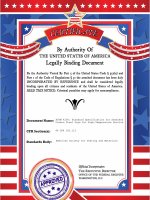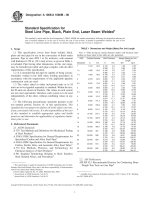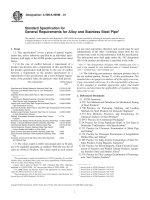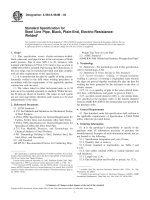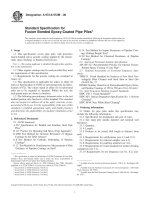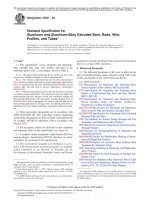ASTM D 259 (1977) Specification for Woven Tapes (Withdrawn 1988)
Bạn đang xem bản rút gọn của tài liệu. Xem và tải ngay bản đầy đủ của tài liệu tại đây (169 KB, 3 trang )
($\b&-& ASTM D259 77 075’7530 0026195 b
ANSVASTM D 259 - 77 ______7
NOTICE: This standard has either been superseded and replaced by a new version or discontinued.
Contact ASTM International (www.astm.org) for the latest information.
Standard Specification for
WOVEN TAPES’
This Standard is issued under the fixeddesignation D 259; the number immediately following fhe designation indicates the
year of original adoption or, in the case of revision, the year of last revision. A number in parentheses indicates the year of
last reapproval.
1. Scope 4.3 Thickness:
4.3.1 The average thickness of the tape
1.1 This specification covers woven tapes shall not vary from that specified by more
made from synthetic or natural fibers, or than the following:
both.
Permissible variations,
1.2 This specification covers those woven
tapes having a maximum thickness up to Nominal thickness, in. (mm) in. (mm)
0.020 in. (0.50 mm) with permissible listed
tolerances. 0.011 (0.30) and under f 0.0015 (0.040)
Over 0.011 to 0.020 (0.30 to f 0.002 (0.050)
NOTE-The values stated in U. S. customary 0.50)
units are to be regarded as the standard.
4.3.2 Individual thickness measurements
2. Applicable Documents shall not vary from the nominal thickness
specified by more than the following:
2.1 ASTM Standards:
D 76 Specification for Tensile Testing Ma- Nominal thickness, in. (mm) Permissible variations,
in. (mm)
chines for Textiles” 0.011 (0.30) and,under
D 123 Definitions of Terms Relating to Over 0.011 to 0.020 (0.30 to 5 0.002 (0.050)
f 0.004 (0.100)
Textiles2, 0.50)
D 629 Quantitative Analysis of Textiles3
D 1682 Tests for Breaking Load and EIon- 4.4 Construction:
4.4.1 The total number of ends shall not be
gation of Textile Fabrics2 less than specified.
D 1777 Measuring Thickness of Textile 4.4.2 The picks per inch shall not vary by
more than the following:
Materials2
D 1910 Tests for Construction Characterís- Pick count Permissible vari-
ations
tics of Woven Fabrics2 48 per i in. (25 mm) and under
Over 48 per 1in. (25 mm) f 1pick
3. Defimitions 2 2 picks
3.1 For definitions of textile terms used in 4.5 Breaking Strength -The average
this specification, refer to Definitions D 123. breaking strength of the tape shall not be less
than the specified breaking strength.
4. Tolerances
4.6 Nonfibrous Materials -The amount of
4.1 Yards Per Pound-The average length nonfibrous materials shall not be more than
per unit weight of the tape in yards per pound that specified.
shall not be less than the specified value.
This specification is under the jurisdiction of ASTM
4.2 Wfdth-The average width of the tape Committee D-13 on Textiles, and is the direct responsibü-
shall not vary from that specified by more ity of Subcommittee D13.59 OnFabricTestMethods, Gen-
than the following:
eral.
Nominal width, in. (mm) Permissible variations, in. Current edition approved Feb. 25,1977. Published May
Less than I (25) (mm) 1977. Originally published as D 259 - 26 T. Last
1to 1 % (25 to 38) previous edition D 259 - 44 (1975).
over 1 % (38) Zk ‘/32 (0.80)
k ’I64 (1.20) Antiiial Book of ASTM Standards, Part 32.
ti &/i6(1.60) Annual Book o f A S T M Sfandards, Part 33.
120
3 I
ASTM D259 7 7 I0 7 5 9 5 3 0 0 0 2 b 3 9 b A E
4ilP D 259
5. Sampling 6.5.1 Determine the breaking strength of
the tape on a tensile testing machine conform-
5.1 A minimum of three rolls is to be ran- ing to Specification D 76. Discard results
domIy drawn from each shipment of tape. The from specimens that break in the clamps of
following tests are to be made on lengths cut the testing machine.
from each roll.
6.5.2 Test the specimens in the warp direc-
6. Test Methods tion by the strip method (full width) as di-
rected in Method D 1682. The initial distance
6.1 Yards Per Pound: between the clamps shall be 3 in. (75 mm).
6.1.1 Determine the yards per pound of
tape as directed in Methods D 1910. 6.5.3 Test the specimens in the direction of
6.1.2 For each shipment, make a minimum the filling by the grab method as directed in
of three determinations on specimens, each of Method D 1682. The initial distance between
which has been taken from a different roll. the clamps shall be I/s in. (3 mm).
The average of these three determinations
shall be considered the average weight of the 6.5.4 Make at least five determinations of
shipment involved. the warp and filling breaking strength from
6.2 Width: each roll selected. T h e average of al1 tests for
6.2.1 Determine the width of the tape as each direction shalI be considered the strength
directed in Methods D 1910. of the lot.
6.2.2 Make at least ten measurements of
width from each roll selected and record the 6.6 Nonfibrous Materials:
average and the range of width. 6.6.1 Determine the total amount of nonfi-
6.3 Thickness: brous materials as directed in Section 8 of
6.3.1 Determine the thickness of the tape Method D 629. Perform the test on a com-
as directed in Method D 1777. posite sample of approximately 5 g.
6.3.2 Make at least ten measurements of 6.6.2 Make at least one determination of
thickness from each roll and record the aver- nonfibrous material content from each roll
age and the range of thickness. selected. The average of these determinations
6.4 Construction: shall be considered the amount of nonfibrous
6.4.1 Ends-Determine the total number materials for the lot.
of ends for the full width of tape as directed in
Methods D 1910. 7. Conformance
6.4.2 Picks -Determine the number of
picks as directed in Methods D 1910. 7.1 The purchaser and the supplier may
6.4.3 Nimber of Tests: agree on a procediire to establish conform-
6.4.3.1 Ends-Make one determination of ance, including control charts furnished by the
total warp ends from each roll selected and supplier, a sequential sampling plan, or the
record. double sampling plan outlined in 7.2.
6.4.3.2 Picks -Make three determinations
of picks per inch from different places from 7.2 In the absence of a control chart or
each selected roll. Average all results and sequential sampling plan, proceed as directed
record. in 7.2.1 through 7.2.3.
6.5 Breqking Strength:
7.2.1 If the test results for the lot conform
to the tolerances for all characteristics speci-
fied in Section 4, consider the lot a valid
delivery.
7.2.2 If the test results for one or more
A S T M D257 77 I0759510 002bL77 T--9
({lbp D 259
characteristics do not conform to the toler- one test of double the original number of
ances, take a new laboratory sample from specimens. If the new average(s) conform(s)
either the original lot sample or a new lot to the specified tolerances, consider the lot a
sample. Retest the lot for the characteristic(s) ' valid delivery.
that did not conform to the tolerances in the
first test, and average the results of the first 7.2.3 If the test results obtained as directed
and second samples as if the results were from in 7.2.2 do not conform to the specified toler-
ances, consider the lot a nonvalid delivery.
The American Societyfor Testing and Materials takes no position respecting the validity of any patent rights asserted
iti connectiori with any item mentioned in this standard. Users of this standard are expressly advised that determination
of the validity of any such paient rights, and the risk of infringement of such rights, is entirely their own responsibility.
This standard is subject io revision at any time by the responsrble technical committee and must be reviewed every five
years and if iiot revised, either reapproved or withdrawn. Your comments are invited eitherfor revision ofthis standard or
for additional standards and slioi
at a meeting of the responsible technical committee, which you may attend. I f y o u feel that yoiir comments have not received
a fair hearing you shoirld make yoiir views known io the ASTiM Committee on Standards, 1916 Race SI., Philadelphia, Pa.
19103, which will schedule a further hearing regarding your comments. Failing satisfaction there, you may appeal to the
ASTM Board of Directors.
